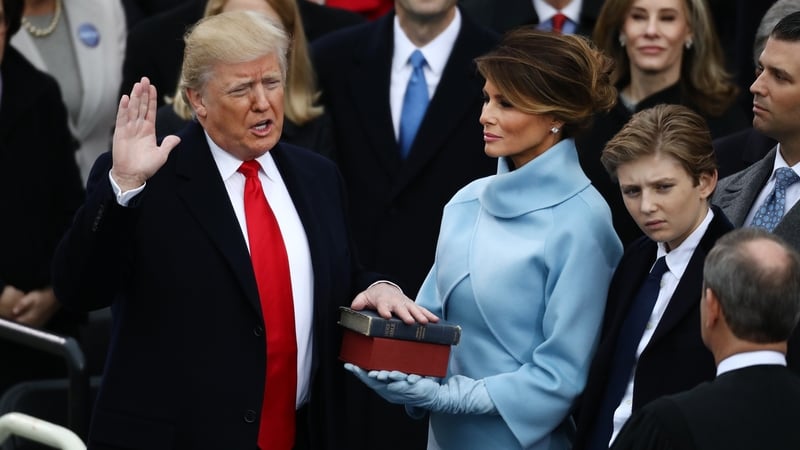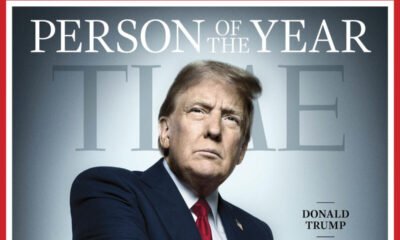Politics
Trump’s Inauguration. From Dismantling The ‘Deep State’ To Redefining Constitutional Order And Rethinking Immigration Raids, A New Chapter In American Politics?
Published
1 year agoon

Washington buzzed with a mix of anticipation and tension as President-elect Donald Trump arrived ahead of his second inauguration. The city, steeped in historical significance, found itself once again at the epicenter of a political storm, with thousands taking to the streets in protest, while Trump’s loyal supporters prepared to celebrate his return to power.
A Chilly Reception—Literally and Figuratively
Braving record cold temperatures and light rain, protesters gathered for the “People’s March” on Saturday. With echoes of the 2017 Women’s March—albeit on a smaller scale—activists marched from the White House to the Lincoln Memorial, demanding protection for women’s rights, racial justice, and environmental policies.
Some donned the now-iconic pink hats of the earlier movement, while others carried signs that showed their fears of Trump’s policies in his second term. “We’re here to say we won’t back down,” said one protester, emphasizing concerns over reproductive rights and civil liberties.
This year’s protests, while significant, reflected a fractured opposition. Trump’s defeat of Democratic Vice President Kamala Harris in November left many in the women’s rights movement disheartened, contributing to the reduced turnout. Local police estimated around 25,000 attendees, far fewer than the anticipated 50,000.
Trump’s Vision, Dismantling the “Deep State”
As protests raged outside, Trump’s team worked feverishly to solidify plans for his second term. A central focus? Dismantling what he and his allies refer to as the “deep state.” The administration is poised to introduce an executive order on day one, aiming to reclassify up to 50,000 federal employees, stripping them of job protections and replacing them with political appointees.
Dubbed “Schedule F,” this reclassification plan first emerged during Trump’s final months in office in 2020. Reviving it now signals Trump’s intent to reshape the federal workforce, injecting loyalists into key roles to accelerate his agenda. Critics argue this move undermines the independence of federal agencies, but Trump’s allies see it as a necessary step to prevent bureaucratic resistance.
The Players in Trump’s Shakeup Game
Key figures in this overhaul include Russell Vought, the architect of Schedule F, and Sergio Gor, who will lead the White House personnel office. Together with James Sherk, another Schedule F advocate, the team is preparing to implement sweeping changes across government agencies.
Other notable figures in this effort include Attorney General nominee Pam Bondi, FBI director hopeful Kash Patel, Secretary of State nominee Marco Rubio, and national security adviser Mike Waltz. Linda McMahon is tapped for the Department of Education, while Elon Musk and Vivek Ramaswamy will spearhead a government efficiency initiative.
Despite the high-profile names, Trump’s transition team has been tight-lipped about the timeline for these sweeping changes, acknowledging that federal rule-making procedures could delay implementation by months.
“The Trump Administration will have a place for people in government who are committed to defending the rights of the American people, putting America first, and ensuring the best use of tax dollars,” said spokesperson Brian Hughes.

Critics Sound the Alarm
However, not everyone is on board with Trump’s plans. Critics and federal worker unions argue that the concept of a “deep state” is a conspiracy theory designed to justify a power grab.
James Eisenmann, a lawyer specializing in federal workforce policy, warned that the Schedule F reclassification could stifle employee morale and productivity.
“People are going to be afraid to speak up or even suggest something helpful out of fear of getting fired,” Eisenmann said. “When fear takes over, efficiency and innovation take a backseat.”
Steve Lenkart, executive director of the National Federation of Federal Workers, went a step further, likening the plan to creating a “secret police” within the federal government. “The incoming administration admits they will use Schedule F to subject employees to political loyalty tests and purge undesirables,” Lenkart claimed.
A Glimpse into Trump’s Vision
During Senate confirmation hearings, nominees Russell Vought and Pam Bondi offered a glimpse into the administration’s strategy. Vought, a staunch advocate of Schedule F, emphasized the need to reclassify career employees to ensure alignment with the president’s agenda.
Bondi, meanwhile, called out partisanship within the Justice Department, citing Special Counsel Jack Smith’s investigations into Trump as evidence. However, she avoided direct questions about targeting Trump’s political adversaries, promising instead to keep the department free of political bias.
Identifying “Targets” in the Bureaucracy
The Trump team’s efforts to identify federal employees whose views might clash with the administration are already underway. In December, the conservative American Accountability Foundation, with backing from the Heritage Foundation, sent a letter to Pentagon nominee Pete Hegseth listing 20 military leaders they deemed too focused on diversity and inclusion.
Outgoing Defense Secretary Lloyd Austin defended these initiatives, stating they reflect America’s diversity. Still, the group has continued to name federal employees they believe are resistant to Trump’s border-security policies, promising to release more names soon.

What About Immigration? Trump’s Controversial Raids Under Scrutiny
The incoming Trump administration is also thinking with how to handle immigration enforcement amid mounting criticism and leaked details of planned raids. President-elect Donald Trump’s “border czar,” Tom Homan, hinted that the timeline and scope of operations might change due to recent leaks.
The Leak and Its Fallout
Homan, the former acting director of U.S. Immigration and Customs Enforcement (ICE), had earlier stated that no final decision had been made regarding the proposed immigration raids in Chicago. “We’re looking at this leak and will make a decision based on this leak,” Homan said, adding that the administration was weighing its options.
Reports had suggested that large-scale sweeps were set to begin in multiple cities as early as Monday, with Chicago likely serving as the starting point. Dulce Ortiz, president of the Illinois Coalition for Immigrant and Refugee Rights, stated that up to 200 ICE agents were expected to launch operations at dawn, targeting individuals on their way to work.
Trump’s Tough Talk on Deportations
In an interview, Trump reaffirmed his commitment to mass deportations, calling them a top priority. While declining to name the targeted cities, he promised swift action, saying, “It will begin very quickly. We have to get the criminals out of our country.”
Homan echoed this sentiment describing “targeted enforcement operations” aimed at some of the 700,000 migrants under deportation orders. He emphasized that the operations were meticulously planned, with specific individuals identified to ensure officer safety.
Sanctuary Cities in the Crosshairs
Trump’s immigration strategy has nevertheless drawn sharp criticism from sanctuary cities, which have vowed not to cooperate with federal raids. Homan labeled these policies “unfortunate,” arguing that they compromise public safety by releasing individuals from local jails who are under deportation orders.
“Cities release that public safety threat back into the community and force ICE officers into neighborhoods,” Homan said, calling on local officials to assist with enforcement efforts. He made it clear, however, that ICE would proceed regardless of local cooperation: “We’re going to do this, with or without their help. They are not going to stop us.”
The Ominous Warning. Germany’s Concerns Over Trump’s Second Term Agenda
Germany’s ambassador to the United States, Andreas Michaelis, has issued a warning about the potential ramifications of Donald Trump’s return to the White House. In a confidential document dated January 14 Michaelis painted a picture of “maximum disruption” under Trump’s second term, with dire consequences for U.S. democratic institutions and global stability.
A Redefinition of Power
The briefing, signed by Michaelis, asserts that Trump’s agenda aims for “maximum concentration of power with the president at the expense of Congress and the federal states.” It warns that foundational democratic principles, including the independence of law enforcement, the judiciary, and the media, could be significantly undermined.
One of the most alarming claims in the document is that big tech companies could be granted “co-governing power.” It suggests a future where checks and balances are eroded, and key institutions are transformed into political tools.
A German Perspective
Despite the sobering tone of the report, the German foreign ministry emphasized its commitment to working with the new U.S. administration, stating that Trump’s election was a democratic choice by American voters. The outgoing government of Chancellor Olaf Scholz has largely avoided public criticism of Trump, but Michaelis’ assessment offers an unvarnished view of the challenges Berlin anticipates.
Ambassadors are typically not replaced with a new government unless specific circumstances warrant it. This ensures continuity in diplomatic relations, even in the face of significant political shifts.
Judiciary and Justice Department in Focus
Michaelis identifies the judiciary, particularly the U.S. Supreme Court, as central to Trump’s strategy. While recent rulings have expanded presidential powers, the document notes that even the court’s harshest critics believe it will act as a brake on Trump’s most extreme ambitions.
Control over the Justice Department and the FBI is seen as pivotal for Trump to achieve his political and personal goals, including mass deportations, targeting perceived adversaries, and securing legal immunity. The report also raises concerns about Trump’s potential use of military force within U.S. borders, referencing the 1878 Posse Comitatus Act, which limits such deployments except under specific conditions.

Freedom of Speech Under Threat
The ambassador predicts a “redefinition of the First Amendment,” pointing to actions already underway. Trump is accused of using lawsuits, threats of criminal prosecution, and media license revocations to silence critics. Meanwhile, billionaire Elon Musk, owner of X (formerly Twitter), is accused of manipulating algorithms and blocking accounts of dissenters.
Musk’s controversial endorsement of Germany’s far-right Alternative for Germany (AfD) party has further strained relations. While Berlin has refrained from leaving Musk’s platform outright, his actions have drawn significant ire.
Germany’s relationship with the U.S. under Trump’s first term was challenging, marked by tariffs and criticism over Germany’s NATO defense spending. Michaelis’ report illuminates the fears that these tensions could deepen, particularly with Trump’s inward-focused and disruptive policies.
The Last Bit
The ambassador’s warnings cast a long shadow over the prospect of Trump’s second term, signaling a turbulent period for U.S.-Germany relations and raising global concerns about the stability of democratic norms. Whether these predictions materialize remains uncertain, but the document does lay bare what could be instore in Trump’s second term.
Meanwhile, The Trump administration’s aggressive stance on immigration is shaping up to be one of its most contentious policies. As the president-elect prepares to take office, the nation watches closely, divided over whether these measures are a necessary step to secure borders or an overreach that threatens fundamental values.
Trump’s team sharpens its focus on reshaping the federal workforce, proponents argue that these changes will make government more efficient and aligned with the administration’s priorities. Critics, however, fear it will create a culture of fear and threatening the independence of federal institutions.
Trump’s second term promises to be nothing short of transformative—or disruptive, depending on whom you ask. From reshaping the federal government to redefining constitutional norms, his plans have sparked debates about the balance of power and the future of American democracy—whether this will lead to streamlined efficiency or unprecedented upheaval remains to be seen.
For now Trump’s inauguration remains the central theme.
You may like
-


Germany’s Friedrich Merz’s Big Balancing Act—Trump, Borders & Europe’s Future. Can He Deliver?
-


Salvaging The $44 Billion Investment In X. Winds Of Change For Musk Amid His ‘Fix’ Mission Over High Support For Zelenskyy On X
-


Why Are Japanese Companies Not Happy With Trump? How Trump 2.0 Is Shaking The World Into A ‘Rude’ Awakening?
-


After A Tough Year In China, And Plummeting Sales, Can Tesla’s India Gamble Steer It Back On Track Amid Musk’s Controversies?
-


Will Ukraine Get A Raw Deal Despite 3 Years Of War? Trump-Putin Alliance Puts Zelenskyy In A Corner, While Europe Senses Trouble—Can Europe Stop This?
-


From 14 States Suing DOGE To Musk’s Agenda Of Deleting Entire Federal Agencies—DOGE Has Emerged Un-Able To DOGE Drama!
